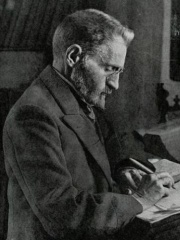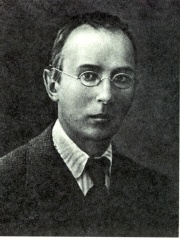

The Most Famous
LINGUISTS from Lithuania
Top 2
The following people are considered by Pantheon to be the most legendary Lithuanian Linguists of all time. This list of famous Lithuanian Linguists is sorted by HPI (Historical Popularity Index), a metric that aggregates information on a biography's online popularity.

1. Eliezer Ben-Yehuda (1858 - 1922)
With an HPI of 72.93, Eliezer Ben-Yehuda is the most famous Lithuanian Linguist. His biography has been translated into 71 different languages on wikipedia.
Eliezer Ben‑Yehuda (born Eliezer Yitzhak Perlman; 7 January 1858 – 16 December 1922) was a Russian–Jewish linguist, lexicographer, and journalist who immigrated to Jerusalem in 1881, when the Ottoman Empire ruled it. He is renowned as the lexicographer of the first Hebrew dictionary and also as the editor of Jerusalem-based HaZvi, one of the first Hebrew newspapers published in Palestine. Ben-Yehuda was the primary driving force behind the revival of the Hebrew language.

2. Kazimieras Būga (1879 - 1924)
With an HPI of 59.97, Kazimieras Būga is the 2nd most famous Lithuanian Linguist. His biography has been translated into 20 different languages.
Kazimieras Būga (Lithuanian pronunciation: [kɐˈzʲɪˈmʲiərɐs buːˈɡɐ]; November 6, 1879 – December 2, 1924) was a Lithuanian linguist and philologist. He was a professor of linguistics, who mainly worked on the Lithuanian language. He was born at Pažiegė, near Dusetos, then part of the Russian Empire. Appointed as personal secretary to Lithuanian linguist Kazimieras Jaunius he showed great interest in the subject, and during the period 1905-12 studied at Saint Petersburg State University. After that, he continued his work on Indo-European language under the supervision of Jan Niecisław Baudouin de Courtenay. He later moved to Königsberg to continue his studies under the direction of Adalbert Bezzenberger. In 1914 he received a master's degree in linguistics. His research on Lithuanian personal names led him into the study of place-names. From these he was able to determine that the homeland of the Lithuanians and other Baltic peoples up to the 6th to 9th centuries CE had been just north of Ukraine in the area around the Pripyat River. In addition, he studied the chronological sequence of Slavic loanwords in the Baltic languages. He also carried out a linguistic reconstruction of the names of the early princes of the Grand Duchy of Lithuania and refuted the theories of their Slavic origin. This became the main thrust for the concept of the Academic Dictionary of Lithuanian (Didysis Lietuvių Kalbos Žodynas) in Lithuanian. He died in Königsberg, and was buried at Petrašiūnai Cemetery in Kaunas.
People
Pantheon has 2 people classified as Lithuanian linguists born between 1858 and 1879. Of these 2, none of them are still alive today. The most famous deceased Lithuanian linguists include Eliezer Ben-Yehuda, and Kazimieras Būga.

